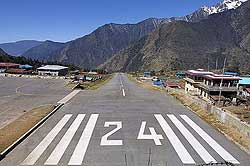 Outside the airport, in this village with a runway, a member of the Armed Police Force is beating a Tamang porter with a bamboo rod. "Move on," he commands and the porter, hungry enough to try to ignore the cop, stands his ground. The police officer, younger than the man he's hitting, winds up like a professional tennis player and wallops his victim on the back of the neck. The stick breaks from the force of the blow.
Outside the airport, in this village with a runway, a member of the Armed Police Force is beating a Tamang porter with a bamboo rod. "Move on," he commands and the porter, hungry enough to try to ignore the cop, stands his ground. The police officer, younger than the man he's hitting, winds up like a professional tennis player and wallops his victim on the back of the neck. The stick breaks from the force of the blow. That decides the contest and the porter picks up his load of goat meat and moves away from the airport, muttering to himself. I suggest to the APF man that he's just helped recruit another Maoist and he laughs and ushers me past, politely, the broken stick still in his hand. On my way to the airport to catch the Kathmandu flight-at $182, not far from the average annual income of rural Nepal-another APF man was stopping Nepalis unescorted by foreigners or Sherpas from going to the airport, cursing them and waving his rifle. Ethnic criteria seemed to apply. That is, janjatis need not apply.
Lukla closes early these days. By 7PM, the streets are deserted except for APF patrols. (See also: 'Sagarmatha's buffer zone is vanishing', Nepali Times, #164.) There's a curfew of sorts but it doesn't apply to foreigners or people known to the police-only to those same porters who crowd the town in search of a little work. Again, I suggest, discrimination that lends itself to Maoist recruitment better than any hoary ideology from the past.
Much that seems inexplicable is going on here. The evening before, I stopped at my hotel bar for a can of Tuborg. I proposed a game of billiards to my companion. No, no, the bartender says, the security forces have asked me to close the pool table. Close the pool table? That's right, he says, a senior policeman in plain clothes, dropped by for a drink in mid-afternoon and said no one should be playing pool after 5PM. Er, I said, um, yes, at a loss for words just that once. A pool hall down the street frequented by those porters had a similar edict imposed by the police. Not that denying people the right to play billiards would drive them into the arms of a rebel group, but as an example of the growing and unaccountable power of the security forces, it's an interesting thing to contemplate.
And why, I wonder, is there a curfew in a tourist town like Lukla? Up the trail in Namche Bazar, the music never stops and I've got the bags under my eyes to prove it. Namche brims with energy and money with nary a Maoist in sight. No security forces to speak of either, unless you count the desultory backpack check on the outskirts from a mixed army and police brigade, more interested in chatting up female trekkers than interdicting rebel arms shipments in porters' loads.
The curfew, it seems to me, is to make things easier for the police, not to keep the people safe. First of all, there is no active Maoist presence in Lukla itself, although from time to time, reports trickle in of rebel activity four days walk south towards Okhaldhunga. The APF is garrisoned there to protect Lukla airport, which has admittedly, been attacked in the past. But by simply being there, doesn't the APF make Lukla an even more tempting rebel target? Not to mention, the way that some officers at least seem to view some local people of certain ethnic groups. Can you not argue that such casual brutalities are a form of discrimination against honest men who are looking for honest work, driving them towards insurgency by treating them with disrespect?
On the good side, after watching the private airlines in action at Lukla airport, I now know that Nepalis are capable of running anything. The planes wheel up to the apron, disgorge hard currency, er, trekkers, then take on a load of the same before heading back to base in Kathmandu. A few minutes is all that's needed and only weather or mechanical problems slow things down. It all proceeds with cheery efficiency. The Twin Otters and Dorniers thunder up and down the ridiculously angled runway and keep the local and national economy afloat, at least for now.
It all works wonderfully for the local elite and the foreign trekkers. It's a different story if you're a porter from another district or ethnic group.



